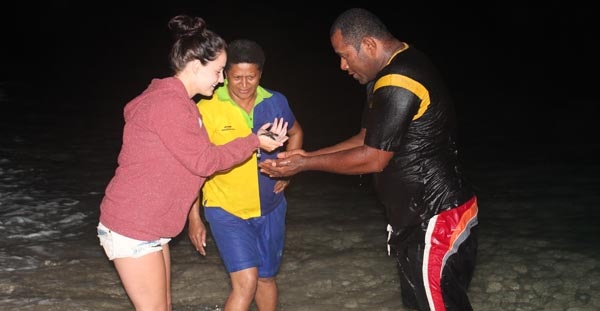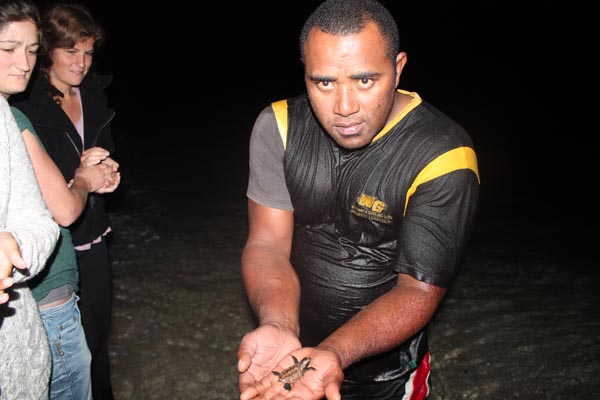An extraordinary experience of life – Saving turtles on South Sea Island
By EMOSI LASAQA
Apart from a slight drizzle, September 13 started like any other at the tiny South Sea Island.
It was not until about 3pm as the sun began making its descent in a cloudy Thursday afternoon when things changed dramatically after the Island Manager Salaseini Baleilakeba came across two guests taking photos of turtle hatchlings on the South Beach.
“I was on my way to alert them that the coconut demonstration activity was about to start. Imagine my surprise when I saw them taking photos of tiny baby turtles. I was shocked because for the past four years, this is the fist time for me to see that happening here,” said Mrs Baleilakeba.
The news spread quickly across the tiny island and in no time, the beach was crowded with 24 staff and a few guests.
Mrs Baleilakeba said some of the hatchlings were crawling towards the sea but they noticed that the others were not moving.
“We collected them up and put them in a tin basin of sea water and we noticed that most of them were already dead-from what, we don’t know. We followed the trail and found the nest and we found some more hatchlings struggling to crawl out.
“There were 57 of them altogether but sadly 46 of them died and they were buried in their nest,” she adds.
Six hatchlings were released on Friday morning around 5am while the rest was released on early Saturday morning.
All the staff and guests-about 10 of them took part in the early morning rescue.
British national Sarah Bowden who was part of the rescue said the discovery changed her already perfect holiday to another level.
“We found shelter whilst it rained (Thursday afternoon) and a local man came over to us to explain that they had found turtles and asked us if we wanted to join the crowd to help rescue them. Everyone joined together as the locals working on the island dug in the sand and found as many turtles as they could. They placed them into water and watched them carefully to protect the ones that were still alive.
“They were all very excited and immediately contacted someone to find out how to help them. The turtles were kept and changed in water overnight until we all got up at 5am (Friday morning) to release the turtles one by one slowly into the sea.
“The man swam deep in before letting go to make sure they got in safely. It was wonderful to watch and experience something so natural yet so rare to this side of the world.
“Watching a little hatchling go into the water is almost agonising. They are so light that the surf swirls them around, throws them back up on the beach, sucks them out, and repeats the process until eventually they become one with the water.
“The little guy I was watching got thrown around just a little, then a wave came that picked him up and took him away. Witnessing the hatchling crawl out of its nest and begin its life in the ocean, made me realize for the millionth time how lucky I am. After all, how many people in the world can walk down to the beach on early morning and witness nature at its finest? We absolutely loved Fiji thank you and I fully intend on returning,” said Ms Bowden.
Mamanuca Environment Society Betani Salusalu said while the death of hatchlings at South Sea Island was sad, research has proved that approximately one in 1000 hatchlings make it to adulthood.
He said nobody really knows what the turtles do when they enter the water and begin to grow up in the ocean but the first 10 years of their lives are said to be the most dangerous because they are preyed upon by larger marine animals.
“The most interesting thing about turtles is that it is said they return to the place where they were hatched to nest once they reach sexual maturity. The mother of those hatchlings was once the size of the tiny hatchling they saw on Thursday and she survived.
“Since adult sea turtles do not nurture their hatchlings, the female never sees the nest site again. A single female may nest several times during a season and then not nest again for one or two years. Incubation of the nests takes about 45-55 days,” said Mr Salusalu.



